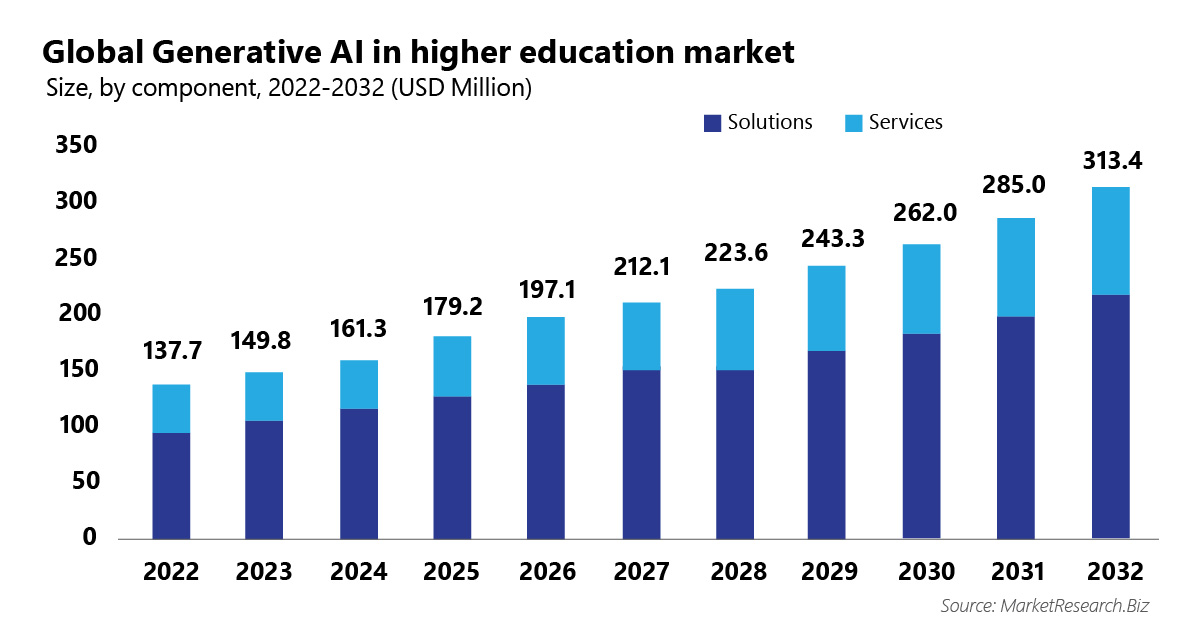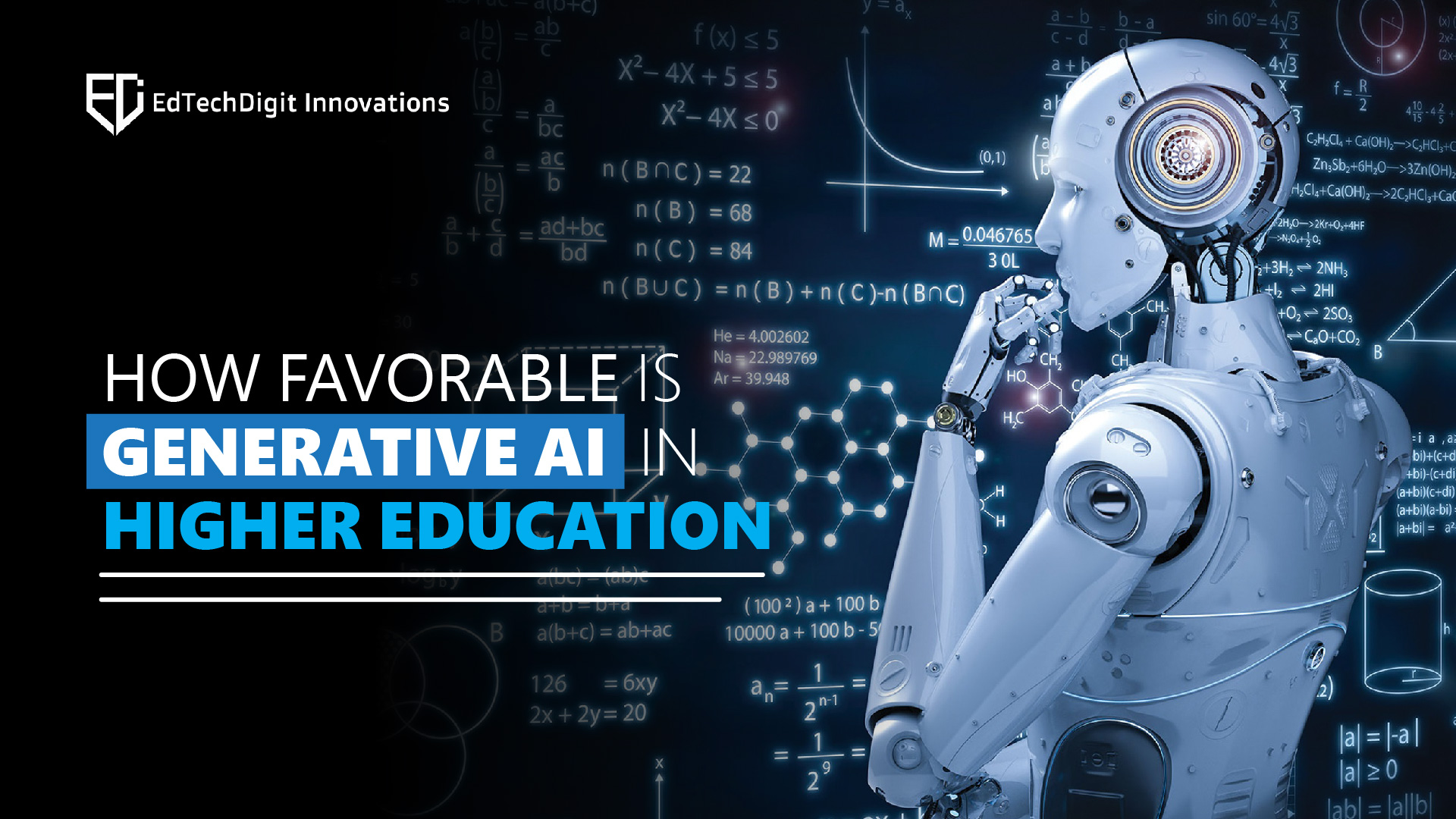
The presentation above shows a clear surge in the global GenAI in the Higher education market worldwide. Artificial intelligence has gained traction and performed massive role in elevating higher education standards worldwide. Generative AI is shaping the higher education regime by revolutionizing teaching methods. With advanced learners support services, educational tools, and administrative processes; the global market for higher education is expanding at an alarming rate. As the years pass, the demand for personalized learning experiences, technological advancements, and the need to improve education outcomes has risen. Let us understand what Generative AI is in Higher Education and how that impacts the broader arena.
What is Generative AI in Education?
Generative AI is a typical artificial intelligence process that generates new information, content, or output. This generative AI differs from the traditional AI methods at a fundamental level. Generative AI in Higher Education utilizes machine learning algorithms to identify patterns from existing data and generate useful content. GenAI enables machines to conduct tasks generally related to human intelligence; such as problem-solving and enhanced learning. If you doubt the power of GenAI; read on to explore the nuanced role that GenAI is to play in the higher education segment.
The following factors driving this growth of Generative AI in the Higher Education Market.
- Personalized learning
- Virtual teaching assistants
- Predictive analytics
- Administrative automation
- Lifelong learning and Skills development
7 Benefits of Generative AI in Education:
- Generating High-quality Educational Resources
GenAI can produce incredible resources for learners across age groups; especially targeted for higher education. These shall redefine learning experiences and improve learning outcomes in a variety of ways. With descriptive examples, exercises, questions, quizzes, and more; eBooks and learning resources are a great revelation for smart education technology.
- Creativity Boost
This gives a tremendous boost to and augments creativity across levels. learners are encouraged to explore their creative side by allowing them to create original content.
- Enhanced Learners’ Engagement
Students can tap into their artistic side by participating in a creative process, such as creating music, or content. This creative freedom to experiment with a variety of ideas can assist in cultivating a profound sense of self. This fosters curiosity and helps students to engage in qualitative learning and discovering experiences.
- Customized Learning Experience
GenAI in curriculum development brings out the best of education that it has to offer. It favors the customization of learning content. AI algorithms can analyze student data and identify patterns involving interests, performance, and learning potential.
- Adaptive Learning
Hyper-customization of the curriculum brings out the most in terms of adaptive learning. This means that data adaptation and real-time content learning are facilitated that assist in evaluating students’ progress continuously.
- Instant Feedback
With this, comes instant feedback for the learners’ prompt success. This yields qualitative feedback and suggestions instantly; hence contributing to an effective learning process.
- Improved Teacher Training
Generative AI in higher education can help produce personalized training modules for educators and teachers. This enhances their new skills related to their profession; and automates student assessment and grading tasks.
Challenges of Generative AI in Education:
- Integrity Concerns
Generative AI technology in education learns from the existing systems and this brings out biases in the output. Learners learning through this system will ingrain the bias without knowing about it. This challenge becomes even bigger when it concerns higher education.
- Security and Privacy
These smart education systems need access to huge amounts of data to generate content. Such data can include sensitive student information; creating loopholes from data breaches and unauthorized access to student data.
- Over-reliance on Technology
After all, generative AI is just a smart technology. Relying too much on it to deliver learning experiences may not be ideal. Such systems can speed up things and customize learning solutions; but may pose a threat if not balanced well with human factors.
Integrating Generative AI (GAI) into higher education is crucial for preparing a future generation of GAI-literate students. GenAI’s potential for delivering personalized learning support, facilitating literature searches, and promoting equity and accessibility in education.

GenAI can develop curricula without any human touch and deliver courses- content, videos, exams, etc. without any human touch. While accreditation boards would never approve, it is possible to automate the entire online education process with Generative AI and CustomGPTs.
What is the thing with- Students-GenAI-CustomGPT?
In today’s day and age, students can rely upon summarizers and converters to reduce their workload. If they choose to avoid summarizers and converters; they can hire GenAI to reflect on how well they are doing and suggest how they might improve their performance. Regardless, they no longer need to read articles, inspect websites, immerse themselves in textbooks, write essays, or take tests. Explore these popularly in-demand GenAI nuances that can ease your journey through enhanced higher education learning!

